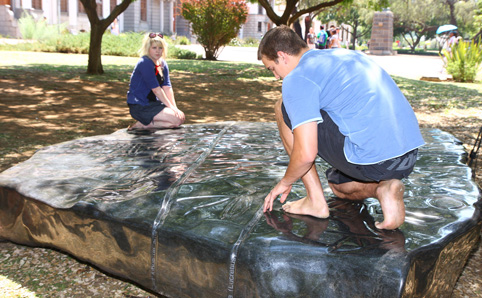Latest News Archive
Please select Category, Year, and then Month to display items
04 April 2024
|
Story Lunga Luthuli
|
Photo SUPPLIED
 Dr Juliet Kamwendo champions gender-inclusive climate action in Africa. Her expertise at the recently held AFR100 workshop highlighted vital steps towards sustainable and equitable development.
Dr Juliet Kamwendo champions gender-inclusive climate action in Africa. Her expertise at the recently held AFR100 workshop highlighted vital steps towards sustainable and equitable development.
Dr Juliet Kamwendo, Lecturer and Programme Director for Gender Studies in the Centre for Gender and Africa Studies at the University of the Free State, is spearheading efforts to integrate gender considerations into Africa's climate restoration agenda. Reflecting on her involvement, Dr Kamwendo stated, "This is particularly crucial, as women make up almost 50% of the population in Africa, and the depletion and degradation of land affect them disproportionately."
She recently served as a gender expert at the AUDA-NEPAD AFR100 workshop in Ouagadougou, Burkina Faso, from 25 to 29 March 2024. This initiative aims to restore forests and degraded land across Africa by 2030, with a focus on gender equality.
The workshop emphasised the integration of gender perspectives into the AFR100 project, acknowledging the disproportionate impact of land degradation on women. Dr Kamwendo's expertise highlighted the need to empower women in climate change interventions, addressing existing gender inequalities exacerbated by environmental degradation.
“Women – who are primarily responsible for household food security and water provision – bear the brunt of environmental degradation, leading to increased workloads, reduced income opportunities, and heightened vulnerability to climate-related disasters. Furthermore, the loss of forest cover and biodiversity further exacerbates the challenges faced by women, particularly in rural areas where they depend heavily on natural resources for their livelihoods,” added Dr Kamwendo.
Her participation highlights academia's crucial role in fostering inclusive and sustainable development, emphasising interdisciplinary collaboration to tackle complex environmental challenges. Through initiatives such as AFR100, stakeholders are working towards a more resilient and gender-responsive future for Africa.
Willem Boshoff’s artwork placed on Bloemfontein Campus
2011-10-21
 |
Students viewing the new artwork on our Bloemfontein Campus
Photo: Hannes Pieterse |
There was great excitement last week when Willem Boshoff’s Thinking Stone sculpture arrived and was installed near our Main Building. The black granite stone, which was quarried at Boschpoort Granite in Belfast, Mpumalanga, weighs approximately 20 tons and took about a year to polish to give it its burnished quality.
On the surface of the stone are engravings that resemble the prehistoric rock engravings of the Driekopseiland rock art site close to Kimberley. Added to the engravings are sandblasted inscriptions in six languages of verses and well-known quotes that refer to the word “rock”.
Willem Boshoff is one of South African’s most established artists and his artworks are deeply involved in relationships and focused on bringing about conversation. Willem describes the Thinking Stone as being “a place for gathering and sharing ideas, as universities should be”. The sculpture is a huge investment for our university and will, for many years to come, inspire thought, dialogue and contemplation.
Willem Boshoff’s sculpture is, to date, the largest of fifteen artworks commissioned by the Sculpture-on-Campus Project and funded by the National Lottery Distribution Trust Fund.